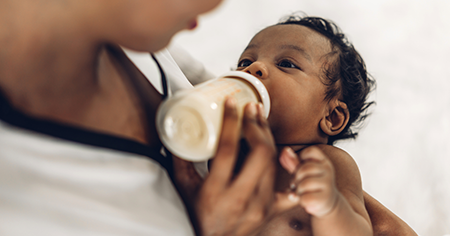 Your first days with your newborn are filled with a mixture of diaper changes, feeding sessions, and periods of sleep. As a new parent, it’s likely you’ll have questions about what to expect and how to best care for your new baby. Fortunately, your health care team is there to help.
Your first days with your newborn are filled with a mixture of diaper changes, feeding sessions, and periods of sleep. As a new parent, it’s likely you’ll have questions about what to expect and how to best care for your new baby. Fortunately, your health care team is there to help.
While in the hospital, you’ll have the chance to ask questions about the basics of newborn care and keeping your newborn healthy at home. Before you go home, here are seven common newborn care topics to make sure you cover.
Feeding
Because a newborn’s stomach is quite small, most newborns eat often. It’s common for newborns to go anywhere from a few hours to only an hour between feedings. While at the hospital, you may keep a feeding log to track how often and how long your newborn eats. This can help if you have any concerns about your newborn’s feeding.
If you’re breastfeeding, it may take some practice to get the right latch and settle into a breastfeeding routine. Your hospital stay is a great time to ask questions and get support. The CDC recommends speaking with a lactation consultant during these first few days.
Diapering
Many new parents worry that their newborn isn’t getting enough to eat. Diapering is a good way to track how well your baby is doing. A study published in the Journal of Human Lactation showed dirty diaper output was the best indicator of feeding concerns. During these first days, your care team is also a great resource if you have questions about what’s normal—and what’s not—when it comes to consistency, color, or number of diapers.
Sleeping safely
Before you leave the hospital, make sure you’re clear on safety when putting your baby to sleep. There are many steps you can take to help soothe your baby while still keeping him or her safe. Ask your doctor or care team if you have questions about pacifiers, swaddling, bedding, or the appropriate sleep location.
Safe to Sleep provides numerous resources for parents on safe sleep and preventing sudden infant death syndrome (SIDS). For example, always put your newborn down on his or her back on a firm sleeping surface when it’s time to go to sleep.
Bathing
Many babies get their first bath while still in the hospital. After that, most newborns only need a bath a few times a week, not every day. The American Academy of Pediatrics says to use sponge baths during the first couple of weeks of life instead of placing your newborn down into the water. And these first weeks are a great time to begin bath time safety, such as never leaving your baby unattended.
Umbilical cord care
At the hospital, your care team will let you know how to care for your baby’s umbilical cord. Ask questions and follow your team’s instructions on care until the umbilical cord falls off on its own. In general, the National Institute of Child Health and Development says you’ll want to keep it dry and clean and watch for any signs of infection like redness or pus.
Follow-up appointments
In addition to a checkup with a pediatrician in the hospital, your newborn will have several follow-up visits during his or her first months. Talk to your pediatrician about the recommended care for your baby and get these appointments scheduled. In most cases, you’ll have a visit a few days after leaving the hospital to make sure things are going well.
When to call the doctor
Your pediatrician or care team may provide you with a list of warning signs that signal a need to get care for your newborn. The American Academy of Family Physicians says some reasons to call the doctor include:
- Problems or changes with feeding, such as weak sucking or inability to wake up to eat
- A fever over 100.4 or temperature below 96.8
- Not enough wet or dirty diapers
- Changes in color, like pale or bluish-gray legs or arms
Overall, if you notice a strange symptom or something feels off, trust your instincts and check in with your baby’s doctor. While the basics of newborn care can help guide you during these first weeks, every newborn is different. Your health care team is your best resource to navigate questions and help you keep your baby safe and healthy.
